UTC to AEST to EST
Time Difference
Universal Time Coordinated is 10 hours behind Australian Eastern Standard Time and 4 hours ahead of Eastern Daylight Time
5:00 pm17:00 in UTC is 3:00 am03:00 in AEST and is 1:00 pm13:00 in EDT
UTC to AEST call time
Best time for a conference call or a meeting is between 8am-10am in UTC which corresponds to 6pm-8pm in AEST
UTC to EST call time
Best time for a conference call or a meeting is between 1pm-6pm in UTC which corresponds to 8am-1pm in EST
5:00 pm17:00 Universal Time Coordinated (UTC). Offset UTC 0:00 hours
3:00 am03:00 Australian Eastern Standard Time (AEST). Offset UTC +10:00 hours
1:00 pm13:00 Eastern Daylight Time (EDT). Offset UTC -4:00 hours
5:00 pm17:00 UTC / 3:00 am03:00 AEST / 1:00 pm13:00 EDT
| UTC | AEST | EDT |
|---|---|---|
| 12am (midnight) | 10am | 8pm |
| 1am | 11am | 9pm |
| 2am | 12pm (noon) | 10pm |
| 3am | 1pm | 11pm |
| 4am | 2pm | 12am (midnight) |
| 5am | 3pm | 1am |
| 6am | 4pm | 2am |
| 7am | 5pm | 3am |
| 8am | 6pm | 4am |
| 9am | 7pm | 5am |
| 10am | 8pm | 6am |
| 11am | 9pm | 7am |
| 12pm (noon) | 10pm | 8am |
| 1pm | 11pm | 9am |
| 2pm | 12am (midnight) | 10am |
| 3pm | 1am | 11am |
| 4pm | 2am | 12pm (noon) |
| 5pm | 3am | 1pm |
| 6pm | 4am | 2pm |
| 7pm | 5am | 3pm |
| 8pm | 6am | 4pm |
| 9pm | 7am | 5pm |
| 10pm | 8am | 6pm |
| 11pm | 9am | 7pm |
| 0:00 | 10:00 | 20:00 |
| 1:00 | 11:00 | 21:00 |
| 2:00 | 12:00 | 22:00 |
| 3:00 | 13:00 | 23:00 |
| 4:00 | 14:00 | 0:00 |
| 5:00 | 15:00 | 1:00 |
| 6:00 | 16:00 | 2:00 |
| 7:00 | 17:00 | 3:00 |
| 8:00 | 18:00 | 4:00 |
| 9:00 | 19:00 | 5:00 |
| 10:00 | 20:00 | 6:00 |
| 11:00 | 21:00 | 7:00 |
| 12:00 | 22:00 | 8:00 |
| 13:00 | 23:00 | 9:00 |
| 14:00 | 0:00 | 10:00 |
| 15:00 | 1:00 | 11:00 |
| 16:00 | 2:00 | 12:00 |
| 17:00 | 3:00 | 13:00 |
| 18:00 | 4:00 | 14:00 |
| 19:00 | 5:00 | 15:00 |
| 20:00 | 6:00 | 16:00 |
| 21:00 | 7:00 | 17:00 |
| 22:00 | 8:00 | 18:00 |
| 23:00 | 9:00 | 19:00 |
Universal Time Coordinated
Offset: UTC is 0 hours ahead Greenwich Mean Time (GMT) and is used in Universal
Coordinated Universal Time (UTC) is the world time standard that regulates clocks and time. It is successor to Greenwich Mean Time (GMT). For casual use, UTC is the same as GMT, but is used by the scientific community.
UTC is the time standard commonly used across the world since 1972. It is used in many technical fields, like aviation industry and meteorologists, also used to synchronize time across internet networks.
UTC representations, usage and related time zones
- Z - is the zone designator for the zero UTC/GMT offset, also known as 'Zulu' time
- +00 - basic short
- +0000 - basic
- +00:00 - extended
- +0000 - sign character (+) followed by a four digit time providing hours (00) and minutes (00) of the offset. Indicates zero hour and zero minutes time differences of the zero meridian.
- Zulu - Military abbreviation for UTC
- Z - short form of 'Zulu'
- Etc/UCT
- Etc/UTC
- Etc/Universal
- Etc/Zulu
- UCT
- UTC
- Universal
- Zulu
- EGST - Eastern Greenland Summer Time
- GMT - Greenwich Mean Time
- WET - Western European Time
- AZOST - Azores Summer Time
- UTC - Universal Time Coordinated
- WT - Western Sahara Standard Time
- Z - Zulu Time Zone
Australian Eastern Standard Time
Offset: AEST is 10 hours ahead Greenwich Mean Time (GMT) and is used in Australia
Countries: It is used in following countries: Australia
Principal Cities: The largest city in the AEST timezone is Sydney from Australia with population about 4.627 million people. Other major cities in the area are Melbourne, Brisbane, Gold Coast, Canberra
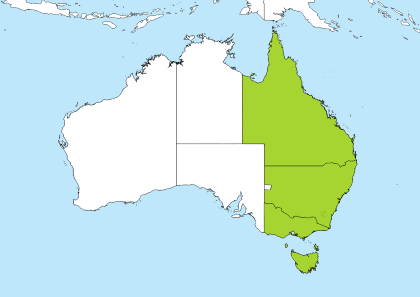
Daylight Saving: This is a standard timezone, however during summer some places switch clocks for one hour forward when daylight saving comes into effect and observe Australian Eastern Daylight Time (AEDT).
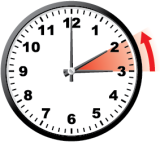 Start: Australian Eastern Standard Time (AEST) started on Sunday, April 4, 2021 at 3:00 am local time and clocks were set one hour back to Sunday, April 4, 2021, 2:00 am. Standard time starts annually the on first Sunday of April.
Start: Australian Eastern Standard Time (AEST) started on Sunday, April 4, 2021 at 3:00 am local time and clocks were set one hour back to Sunday, April 4, 2021, 2:00 am. Standard time starts annually the on first Sunday of April.
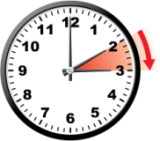 End: Australian Eastern Standard Time (AEST) ends on Sunday, October 3, 2021 at 2:00 am local time and clocks are set one hour forward to Sunday, October 3, 2021, 3:00 am local daylight time instead. Standard time starts annually the on first Sunday of October.
End: Australian Eastern Standard Time (AEST) ends on Sunday, October 3, 2021 at 2:00 am local time and clocks are set one hour forward to Sunday, October 3, 2021, 3:00 am local daylight time instead. Standard time starts annually the on first Sunday of October.
Australian Eastern Standard Time (AEST) is used in Queensland, Victoria, Tasmania, New South Wales (except Broken Hill), Australian Capital Territory and in folling major cities Brisbane, Sydney, Melbourne, Hobart, Canberra
Only part of Australia observe daylight saving. It is used in New South Wales, Victoria, South Australia, Tasmania, and the Australian Capital Territory. Daylight saving is not observed in Queensland, Western Australia or the Northern Territory.
AEST representations, usage and related time zones
- +10 - basic short
- +1000 - basic
- +10:00 - extended
- +1000 - sign character (+) followed by a four digit time providing hours (10) and minutes (00) of the offset. Indicates ten hour and zero minutes time differences to the east of the zero meridian.
- Kilo - Military abbreviation for AEST
- K - short form of 'Kilo'
- Antarctica/Macquarie
- Australia/ACT
- Australia/Brisbane
- Australia/Canberra
- Australia/Currie
- Australia/Hobart
- Australia/Lindeman
- Australia/Melbourne
- Australia/NSW
- Australia/Queensland
- Australia/Sydney
- Australia/Tasmania
- Australia/Victoria
- AEST - Australian Eastern Standard Time
- CHUT - Chuuk Time
- ChST - Chamorro Standard Time
- K - Kilo Time Zone
- KDT - Korea Daylight Time
- PGT - Papua New Guinea Time
- VLAT - Vladivostok Time
- YAKST - Yakutsk Summer Time
- YAPT - Yap Time
Eastern Standard Time
Offset: EST is 5 hours behind Greenwich Mean Time (GMT) and is used in North America
Countries: It is used in following countries: Bahamas, Canada, Haiti, Jamaica, Cayman Islands, Mexico, Panama, Turks & Caicos Is, United States
Principal Cities: The largest city in the EST timezone is New York City from USA with population about 8.175 million people. Other major cities in the area are Toronto, Montreal, Brooklyn, Borough of Queens
French: HNE - Heure Normale de l'Est
Spanish: ET - Tiempo del Este, ET - Zona Sureste
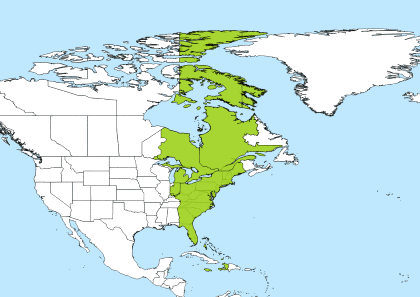
Daylight Saving: This is a standard time zone, however during summer some places switch clocks for one hour forward when daylight saving comes into effect and observe Eastern Daylight Time (EDT).
 End: Eastern Standard Time (EST) has ended on Sunday, March 14, 2021 at 2:00 am local time and clocks were set one hour forward to Sunday, March 14, 2021, 3:00 am local daylight time instead. Standard time ends annually the on second Sunday of March.
End: Eastern Standard Time (EST) has ended on Sunday, March 14, 2021 at 2:00 am local time and clocks were set one hour forward to Sunday, March 14, 2021, 3:00 am local daylight time instead. Standard time ends annually the on second Sunday of March.
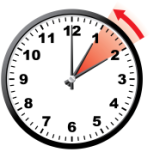 Start: Eastern Standard Time (EST) starts on Sunday, November 7, 2021 at 2:00 am local time and clocks are set one hour back to Sunday, November 7, 2021, 1:00 am. Standard time starts annually the on first Sunday of November.
Start: Eastern Standard Time (EST) starts on Sunday, November 7, 2021 at 2:00 am local time and clocks are set one hour back to Sunday, November 7, 2021, 1:00 am. Standard time starts annually the on first Sunday of November.
EST representations, usage and related time zones
- -05 - basic short
- -0500 - basic
- -05:00 - extended
- -0500 - sign character (-) followed by a four digit time providing hours (05) and minutes (00) of the offset. Indicates five hour and zero minutes time differences to the west of the zero meridian.
- Romeo - Military abbreviation for EST
- R - short form of 'Romeo'
- America/Atikokan
- America/Cancun
- America/Cayman
- America/Coral_Harbour
- America/Detroit
- America/Fort_Wayne
- America/Grand_Turk
- America/Indiana/Indianapolis
- America/Indiana/Marengo
- America/Indiana/Petersburg
- America/Indiana/Vevay
- America/Indiana/Vincennes
- America/Indiana/Winamac
- America/Indianapolis
- America/Iqaluit
- America/Jamaica
- America/Kentucky/Louisville
- America/Kentucky/Monticello
- America/Louisville
- America/Montreal
- America/Nassau
- America/New_York
- America/Nipigon
- America/Panama
- America/Pangnirtung
- America/Port-au-Prince
- America/Thunder_Bay
- America/Toronto
- Canada/Eastern
- EST
- EST5EDT
- Jamaica
- US/East-Indiana
- US/Eastern
- US/Michigan
- CDT - Central Daylight Time
- EST - Eastern Standard Time
- ET - Eastern Time
- COT - Colombia Time
- CST - Cuba Standard Time
- EASST - Easter Island Summer Time
- ECT - Ecuador Time
- PET - Peru Time
- R - Romeo Time Zone
